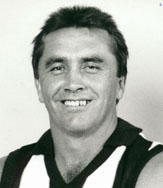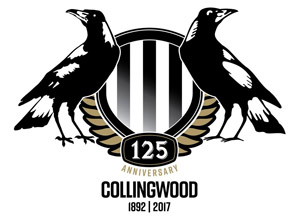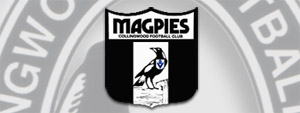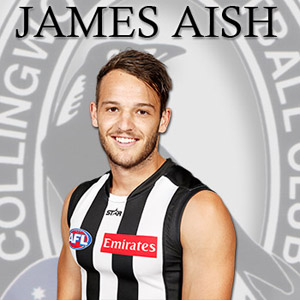Tony Shaw
TONY SHAW – Collingwood Immortal – By Joel
 Jumper: #22
Jumper: #22
D.O.B: 23/7/60
Height: 170cm
Playing Career
Club: Collingwood
Position: Centre
Played: 1977-1994
Debut: 1977
Games: 313
Goals: 153
Honours:
1978 Reserves Best and Fairest
1984, 1990 Copeland Trophy Winner
1981 3rd Copeland Trophy
1983, 1989 Most Courageous Player
1985 Best Team Man
1986 Most Determined Player
1986. 1987 Special Trophy for services to the club
1985, 1986 Deputy Vice Captain
1987-93 Club Captain
1990 Norm Smith Medal
1990 Life Member
1990 Premiership
All Time Collingwood Game Record: 313
TONY SHAW
Anthony ŌĆśTonyŌĆÖ Shaw became a Collingwood immortal after leading the 1990 Magpie side to victory over Essendon in the Grand Final. It was an historic and drought-breaking win. He epitomised Collingwood from the very beginning, and his never die attitude ensured that he would become a Collingwood great.
Shaw joined the Collingwood Football Cub after playing for Reservoir-Lakeside. However, his ascendancy to become captain of the greatest football club in the land nearly did not happen. Shaw had to overcome several obstacles even before his career had really started.
Shaw was told early in his career that he was too slow, could not kick, and that he would never be good enough to make it at the top level. However, Shaw would go on to become the first captain in 32 years to lead a Collingwood team to victory in a Grand Final. Not only that, but he also become the games record holder for the black and white, with 313 games. He proved his critics to be very wrong.
Shaw had a great ball winning ability, fantastic endurance, and very sure hands. His sure hands made him a very effective handballer, while his fantastic endurance meant that he could run all day. Coupled with his awesome courage, this made Shaw a very good footballer.
Shaw showed his critics to be wrong, time and time again. Including when he won the 1978 Reserves Best and Fairest Award. The first time Tony Shaw proved his quality at senior level was when he won his first Copeland Trophy in 1984, following on from his brother Ray, who won the award in 1978. This was to be the first of two Copeland Trophies that Shaw would win throughout his career.
Shaw progressed through the team during the 80s, winning quite a few club awards including, the Best Team Man in 1985, the Most Determined Player in 1986, Special Trophy for services to the club in the years 1986 and 1987 and the award for Most Courageous Player in the years 1983 and 1989. Time and time again, Shaw was to prove his worth to the Collingwood Football Club.
Prior to being given the Captaincy of the club, Shaw was made Deputy Vice Captain in 1985. This was a role he would keep until being made club captain in 1987. The role of captaincy was something that seemed tailor made for the short and stocky bloke.
In 1990, ShawŌĆÖs sheer guts, courage and determination came to fruition when it mattered. He led his team week in and week out, by example. In the grand final, Shaw displayed a best on ground performance, which led to him winning the Norm Smith Medal. This was just the icing on the cake for a bloke that was once told he would never make it at VFL (AFL) level. Not only did Shaw win the Norm Smith that year, but he also went on to win the Copeland Trophy for a second time.
Essendon captain at the time, Tim Watson, had this to say about Shaw, ŌĆ£Never have I seen a captain drive his team like Tony Shaw. He directed, cajoled, instructed and provided the physical example for his teammates, so much so that I firmly believe Collingwood would never have won the 1990 Grand Final without himŌĆØ (Roberts and McFarlane, 2004, p.95). A great tribute, to a great leader.
Fittingly, it was Shaw who combined with Damien Monkhorst for a goal at the 19-minute mark of the last quarter, to seal the game for the Mighty Magpies. The year 1990 was to be the pinnacle of ShawŌĆÖs career. He had proved his critics wrong, and he had accomplished it in style. He received several personal awards, and led the greatest team in the land to a grand final victory.
A memory that will forever be etched in the minds and hearts of Collingwood supporters is after the siren in the 1990 grand final. Many will remember Shaw going to his knees, and to the ground in a display of raw emotion. He would later stand and embrace the premiership coach, Leigh Matthews. Matthews was to say of Shaw, he is ŌĆ£one of footballŌĆÖs greatest captainsŌĆ”I donŌĆÖt think thereŌĆÖs been a better example of real leadership than Shawry, and I donŌĆÖt think thereŌĆÖs a captain whoŌĆÖs had greater influence on his teamŌĆØ (Roberts and McFarlane, 2004, p.95). Later on, he would share in the victory celebrations in a memorable lap around the oval with his teammates.
Following on from 1990, the year 1992 was plagued by injury and bouts of suspension. Then in 1993, knee and thigh problems almost caused the Collingwood great to elect to hang up his boots. He decided at the end of that season (1993), that he would hand over his role as the captain of the Collingwood Football Club to Gavin ŌĆśRowdyŌĆÖ Brown. Nevertheless, despite the injury problems of the previous two seasons, Shaw decided to continue to play on in 1994. It was to be his seventeenth and final season.
Collingwood supporters will remember Tony ShawŌĆÖs last game like it was yesterday. The game was in a final in Western Australia, against Mick MalthousesŌĆÖ West Coast Eagles. The Eagles were a tough and relentless outfit, which had become the first interstate team to win an AFL grand final, just two years earlier, in 1992.
Collingwood went to Perth expecting nothing much, but went there living on the hope that the Magpies could pull off something spectacular. The Pies were to go close, losing the game by on a couple of points. The Pies fought hard, and against all odds nearly pulled off a memorable win. In the dying seconds, a fumbled chest mark by Mick McGuane, albeit under extreme pressure, meant CollingwoodŌĆÖs chance to snatch victory disappeared in a heartbeat. The Eagles were to go onto win the GF, but the Pies left the ground that day knowing that theyŌĆÖd displayed the tenacity and courage that had been displayed by Tony Shaw throughout his whole career. A final memory of that game was watching Shaw lead the Pies off the ground, while being consoled by teammates in what was to be a teary, but hard fought end to his career.
Tony Shaw did go onto coach the Collingwood Football Club for a short stint that was ultimately unsuccessful. However, Tony Shaw should be remembered not for his coaching career, but for his constant endeavour and for the heart he wore on his black and white sleeve.




